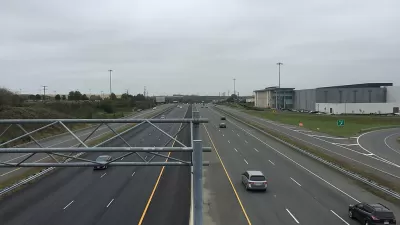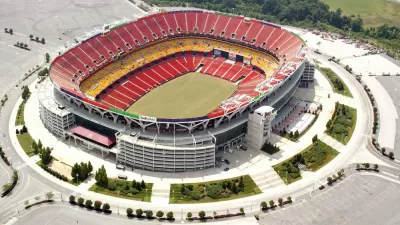New rankings from the 2011 American Community Survey released Thursday show that the residents of the D.C. area have benefited from an economy built on "the federal government, its legions of contractors and a flourishing high-tech sector."
While communities across America have suffered through high unemployment, public sector cuts from dwindling revenues, and foreclosures resulting from the Great Recession, the Washington D.C. metropolitan area has been getting increasingly affluent. New census numbers show that the D.C. suburbs now include 7 of the 10 most affluent counties in the country, with Loudoun County and its median household income of $119,134 topping the list, report Carol Morello and Ted Mellnik.
"The rankings in the 2011 American Community Survey released Thursday
expand Washington's dominance among high-income households, reflecting a
regional economy that was largely cushioned as the recession yanked
down income levels elsewhere. Household incomes rose in most counties
around Washington last year, even as they continued to sink around the country."
Hunterdon and Somerset Counties in New Jersey, and Douglas County in Colorado, were the non-Washington area counties to make the top 10.
FULL STORY: Seven of nation’s 10 most affluent counties are in Washington region

Americans May Be Stuck — But Why?
Americans are moving a lot less than they once did, and that is a problem. While Yoni Applebaum, in his highly-publicized article Stuck, gets the reasons badly wrong, it's still important to ask: why are we moving so much less than before?

Study: Maui’s Plan to Convert Vacation Rentals to Long-Term Housing Could Cause Nearly $1 Billion Economic Loss
The plan would reduce visitor accommodation by 25,% resulting in 1,900 jobs lost.

Placekeeping: Setting a New Precedent for City Planners
How a preservation-based approach to redevelopment and urban design can prevent displacement and honor legacy communities.

San Diego Swaps Parking Lane for Kid-Friendly Mini Park
The block-long greenway will feature interactive play equipment and landscaping.

Tracking the Invisible: Methane Leaks From LA’s Neighborhood Oil Sites
Environmental advocates are using infrared technology to monitor and document methane leaks from neighborhood oil sites, filling regulatory gaps and pushing for stronger protections to safeguard community health and the climate.

Montana Bill Promotes Parking Reform
A bill before the Montana state senate would bar cities from requiring more than one parking spot per new housing unit.
Urban Design for Planners 1: Software Tools
This six-course series explores essential urban design concepts using open source software and equips planners with the tools they need to participate fully in the urban design process.
Planning for Universal Design
Learn the tools for implementing Universal Design in planning regulations.
Caltrans
Heyer Gruel & Associates PA
Institute for Housing and Urban Development Studies (IHS)
City of Grandview
Harvard GSD Executive Education
Salt Lake City
NYU Wagner Graduate School of Public Service
City of Cambridge, Maryland





























